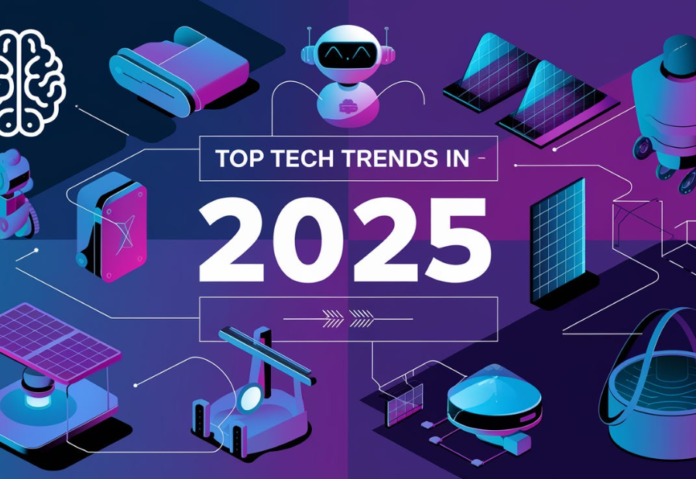As unbelievable as it may sound, 2025 is quickly approaching. I think it’s time to choose the trends that will be most significant in the upcoming year once more.
The most significant trends transcend simple catchphrases. They pinpoint the trajectory of the most revolutionary innovations, which are poised to profoundly alter how we know and engage with the world, as well as how we live and work.
I think that every person and company that wishes to stay ahead of the curve should be aware of these “big picture” concepts. Each of these offers tremendous potential, but there are also unavoidable hazards and moral dilemmas.
We will begin with my high-level summary of the key trends, after which, as the months, weeks, and days leading up to the new year draw to a close, I will delve deeper and examine them at a more detailed level.
The Convergence of Machine and Human Intelligence
Not surprisingly, I will once again choose the technology that has been labelled “more transformative than fire” to have the greatest influence on our lives in the upcoming year.
We are still in the very early stages of the intelligence revolution; thus, in 2025, artificial intelligence is firmly in the present rather than the future. We will continue to witness innovations that push the boundaries in even more astounding and occasionally terrifying ways, from generative video to autonomous AI agents and possibly even quantum-powered AI.
The most significant applications of AI in 2025, in my opinion, will be those that support the symbiotic connections that are emerging between humans and machines. This entails AI technologies that complement human skills and abilities while also more closely aligning with assisting us in our daily tasks.
Breakthroughs that make headlines could take front stage. For instance, as technologies like OpenAI’s Sora grow more accessible, generative video might become more commonplace. However, AI that improves our lives in more subdued, seamless ways will be the trend behind the scenes.
AI applications and tools will be increasingly incorporated into our daily lives, enhancing both our creativity and productivity while enabling us to make better, more informed decisions.
The Biotech Revolution
By 2025, biotechnology—which uses biological science to improve agriculture, health, and environmental sustainability—will still be significantly changing the planet. Innovations like CRISPR-based gene editing will become more widely used, providing individualized care for genetic illnesses like sickle cell anemia, muscular dystrophy, and cystic fibrosis. Tailored therapies will also produce new cancer treatments with better results and fewer side effects.
Biotech innovations will continue to propel agricultural advancements beyond healthcare, allowing for the creation of climate-resilient and disease-resistant crops that lessen the need for dangerous pesticides. Innovations like lab-grown meat will also become more popular since they provide sustainable substitutes for conventional meat production and aid in resolving the world’s food shortage. As biotechnology continues to have an increasingly significant impact on how we live, work, and take care of our planet, developments like these hold the possibility of not just prolonging our lives but also improving our quality of life.
The Climate Tech Challenge
In 2025, a major development sector will be technology aimed at mitigating or even reversing the harm that humans have caused to the environment and aiding in the reduction of carbon emissions.
The economic downturn in 2023 caused a decline in investment in this sector. But in 2024, this has accelerated, and analysts predict that growth will continue over the course of the next year. Unquestionably, this is motivated by a growing sense of urgency as evidence of the effects of climate change in the actual world keeps mounting. Significant progress has been made in recent years, from the rising acceptance of electric vehicles to ground-breaking innovations in carbon capture and storage. 2025, in my opinion, will be a turning point as these and numerous more inventions are expanded and incorporated into daily life. Accelerated research and implementation of renewable energy storage will have a significant impact, as advancements in battery and grid-based technologies are expected to increase efficiency and dependability.
Cybersecurity at Global Scale
By 2025, hackers, data theft, and other cyberattacks will pose a serious threat to multinational corporations. However, the threat to public safety, national security, and society is rapidly outstripping it. Critical infrastructure assaults have increased recently, with cybercriminals focusing on energy grids, healthcare systems, and even election systems.
These attacks have the ability to destabilize economies, interfere with the vital services we depend on on a daily basis, and erode our confidence in those tasked with protecting us. Increased national investment in cybersecurity infrastructure and state-to-state cooperation to exchange intelligence and create joint defense plans will be the answers. Although newly created AI systems will be essential for identifying and stopping assaults, attackers are also likely to use this technology to make life more difficult. This will increasingly be done to further political objectives.Because of this, I think 2025 will be the year that cybersecurity is recognized as a crucial component of both national and international security, rather than merely a technical problem that companies must resolve.
A Quantum Leap in Computing Power
2025 has been declared the International Year of Quantum Science and Technology by the United Nations. Furthermore, even though quantum computing may not have become widely accepted in a way that many of us can currently observe, a number of significant real-world applications emerged in 2024. These include finding new drugs and resolving financial and logistical optimization issues.
It uses superposition and entanglement—two peculiarities of particles when seen at the subatomic level—to perform some computations hundreds of millions of times faster than conventional computers.
The impact of cloud-based quantum computing on our lives may become much more apparent in 2025, as fresh advancements in the technology could make it accessible to a greater number of companies and organizations.
After all, according to experts, it will soon transform a number of industries, including encryption, clean energy, genomics, material discovery, and climate modeling.
Some also think it will have a significant impact on how AI develops since quantum algorithms can analyze data at previously unheard-of speeds for applications like computer vision, autonomous driving, and natural language processing.
But others also believe that “Q-Day” might arrive in 2025. There is a chance that many encryption techniques would become obsolete due to the capabilities of quantum computers, which would have serious repercussions for security and privacy.






